Make Better Decisions With Data

Gut. Feel. Instinct. Intuition. Whatever term you use, this sense of what must be right, along with your hard work, has likely been a key to your success.
Many outstanding entrepreneurs make things happen regardless of whether they leverage data in their decision-making. Jim Barksdale, the former Netscape CEO, once said, “If we have data, let’s look at data. If all we have are opinions, let’s go with mine.”
In truth, very few entrepreneurs start out with access to data; rather, they have a great idea and commitment to making a vision work. Some continue to let intuition drive their success. They refuse to fail, even forcing round pegs into square holes via the sheer will of their leadership.
It doesn’t always have to be that hard.
A data-driven culture doesn’t mean the data makes the decisions; your instinct continues to play a very important role. Decisions come from the analysis of data (leveraging your instinct), which leads to a recommendation based on the analysis.

Even with the best data, it is possible to misinterpret signals, which often happens to artificial intelligence programs that lack human oversight. AI can outperform humans at many tasks, but it takes a tremendous amount of human input for AI to reach a level where it can operate better than data combined with human input.
AI tools can be a part of a data-driven culture, but there are significant problems in trying to use AI alone (not to mention the cost of AI). Human interpretation often overrides AI and is essential to proper data-driven decisions.
You don’t need AI to create a data-driven culture. You need to have a commitment to data. Start with the data you have and, especially early, don’t let use of data stifle creativity or entrepreneurial drive; data can enhance both.
Many leaders will ignore data when confronted with evidence contradicting their instinct. If the data conflicts with your instinct, do not ignore the data. Explore the reasons for the conflict and you’ll improve your decision regardless of the path you choose, and you might even find you need to improve your data collection.
Document what the expected outcome would be if you followed the data as compared to following your intuition. Hold yourself and your team accountable by analyzing the expected outcome versus reality and whether incorporating more insights from data would have produced a better outcome.
Data-driven decisions will outperform instinct-only decisions, but they will still not be perfect. While no amount of data guarantees the right decisions will be made, the more data you collect and leverage, the better your decisions will be.

People often avoid embarking on a data-driven culture because they don’t know where to start or feel it is too difficult to get meaningful data. You don’t have to take an all-or-nothing approach. In fact, you should start small.
Here’s how:
- Set measurable goals and measure progress. It’s OK to start with whatever is available now and iterate.
- Review important analytics weekly or monthly at meetings. These include:
a. Website analytics.
b. Data from your CRM.
c. Sales and profitability reports. - Survey employees and customers. Let results challenge your instinct. Data should guard against your biases.
- Document and measure expected outcomes versus reality.
- Present data in an easy-to-understand format.
As you continually share and maybe even require data in most or all team discussions, you will be building a data-driven culture while at the same time building access to more data. You will likely be impressed how discussions get enhanced when you require data to at least be considered.
Each success will inspire future improvements as people seek to leverage data. Tie every decision back to data, even if you have very little to go on.
Data-driven cultures encourage critical thinking and curiosity. Data-driven cultures can still be highly entrepreneurial and highly agile.
And the more you leverage data, the more agile you can be as people learn from each experience.

